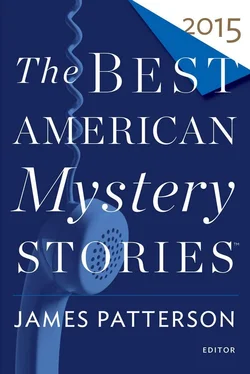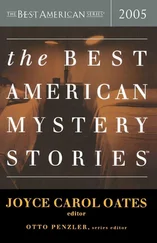“Not the beginning. We got there at nine-ten.”
“But you saw the end?”
“No. The other sniper was on station then. I’d just stepped out into the hall.”
“I saw him do it. Kill himself, I mean. I didn’t see him shoot Martin but I saw him put the gun in his mouth and pull the trigger. All that blood. I was looking at him then. I saw the look in his eyes right before he did it. He realized he didn’t have a choice.”
“He had a choice. Lots of choices. He made a couple of bad ones.”
She didn’t say anything.
I said, “I’m glad you’re all right.”
She said, “Thanks.”
“We don’t have to talk about it if you don’t want to.”
“What should we talk about?”
“Anything you want.”
Again, I didn’t think of it then, but right there she could have turned around and gone home. She could have told me to get lost, told me what a scumbag I was for coming around like this, so soon after what happened. But she didn’t. We kept walking, and talking. We walked around the block five times.
“We started dating.”
From his expression and his tone of voice, Barbara knew the answer to her next question. But she asked it anyway. “Are you still seeing each other?”
“No.”
“When did you stop?”
“A couple weeks ago.”
She nodded, watching him. The sadness in his eyes was the first real emotion she’d seen from him. It wasn’t much, at that, but he obviously wasn’t very expressive. Most people fidgeted at least a little bit when describing stressful situations they’d been through, maybe tapping one foot or wringing their hands, but Keith had just sat there so far. Captain Smith said snipers needed to be able to remain perfectly still for long periods of time. They also had to be intelligent and observant and extraordinarily patient. Keith seemed to have all those attributes.
She said, “So around this time, did you keep having trouble concentrating at work?”
“Yes. Sort of.”
“What do you mean?”
“I, uh, I started seeing targets differently.”
My first sniping assignment after the Guinness case was providing cover for an undercover narcotics officer. He was going to make a buy off a drug dealer in West Miami, back in this industrial area. I was set up on the third floor of an old factory 175 yards away. This was like eleven o’clock at night. Dean was there with me, sweeping the area with night-vision binoculars, but I had my regular scope. The buy was supposed to happen in an open space that was lit with streetlights. I could see just fine. I could see the dealer. He was there before our guy, standing there waiting around. Dean and I joked about that. This guy was supposed to be a big shot, that’s why Narcotics targeted him, but big shots don’t show up early and then stand around waiting. They sure don’t stand around lit up like that, so anyone can see them. We figured this guy was either a small fry who’d been sent there by his boss or he’d just recently jumped up the ranks. If he’d been promoted, at this rate he wasn’t going to stay on top very long.
Dean and I both had headsets on. We were listening to the task force we’d been loaned to arguing about whether they could send their guy out to meet the dealer early without looking suspicious. It was while I was waiting for them to make up their minds that I started noticing things about the dealer. He didn’t look nervous exactly, but he looked, you know... uncertain. Like he really was some low-level guy who wasn’t sure what he was doing yet. I could see his expression clear as day. It made me think of April and the look on her face a couple weeks before.
It bothered me. It worried me. I felt like I could feel how vulnerable this guy was, standing there not knowing I had him in my sights. Snipers can’t afford to do that. They make sure you don’t think that way when you’re in school. That’s why they have you put your sights on real people sometimes, not just bull’s-eyes. I never had a problem with it before. In Iraq most of the targets I took out didn’t know I was there, and some of them were unarmed. I watched some of them for a long time, hours maybe, waiting to get the right shot. I watched one guy for days. That whole time, with all of them, they looked like they were so close I might have been standing right next to them. You get to know somebody’s habits when you watch them like that. You see their mannerisms, you get to know their personalities to some degree. And the whole time you have their life in your hands, right up until the moment when you take it. But it never bothered me.
It was bothering me now. I watched the dealer look up and down the road between the buildings, cross his arms and uncross them, lick his lips and then lick them again like his mouth was dry. I told myself to get over it. This guy was a criminal. He was there to sell drugs. He probably had a gun tucked in his waistband under his shirt. But it didn’t matter. I could feel the power I had over him and it gave me a weird sort of itch between my shoulder blades.
Maybe it didn’t help that the task force was arguing about whether this might be a trap. The dealer looked so clueless, they thought he might be some pissant whose bosses sent him out there as bait. Dean was checking every alley mouth and window for signs of an ambush, but he didn’t see any. Still, we agreed I had to be ready to drop this guy in a heartbeat.
So I kept the crosshairs trained on him. The task force finally decided to send their man out, so I listened to the supervisor giving him last-minute instructions. I listened with half an ear, since now I was thinking about April’s parents, the look in her mother’s eyes when the sight of me made her remember how scared she’d been for April. I wondered if somebody somewhere was worrying about this dealer. I wondered if he had any kids. When I tried to imagine pulling the trigger on him, it made me feel sort of weak and sick.
It turns out I never had to take the shot. The undercover went out there and made the buy and there wasn’t any trouble. The dealer never pulled a gun and no one else ever came out of the shadows. And we got the whole conversation on tape. The task force was happy. I wasn’t. I was relieved I didn’t have to shoot the guy, and when I realized that, I was scared.
Over the next six months, I had I don’t know how many other sniping assignments. I don’t get that many. It must have been June before I had someone in my sights again. During that time I was mostly providing cover for raids on crack houses, watching the windows while the team went in the front door. A couple of times I saw suspects come out windows and make a break for it, but none of them started shooting at the team, so I didn’t have to take them out. I could have done it, though. I’m sure of that. I’d worry about it while I was sitting there staring at the house — I’d worry that I would start to worry, and that would get me going — but when someone popped out a window I snapped into focus. I’m sure I wouldn’t have hesitated if any of them had pulled a gun. I’m sure of it now and I was sure of it then too, and that made me feel better, since I started to think that if it was a different story shooting someone who was shooting at my guys, then I probably could have shot that dealer after all, since that’s the only reason I would have been told to. At least that’s how I figured it. After a while I changed my mind, or realized I was wrong in the first place. The problem wasn’t that I couldn’t shoot a target unless they were dangerous, it was watching their every move that bothered me, getting to know them, and then putting a bullet through their head.
By September I wasn’t sure I could do that anymore.
Barbara said, “Did you tell anyone?”
Читать дальше












